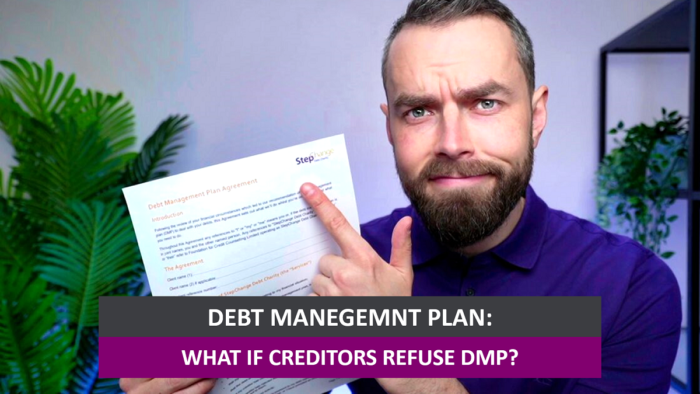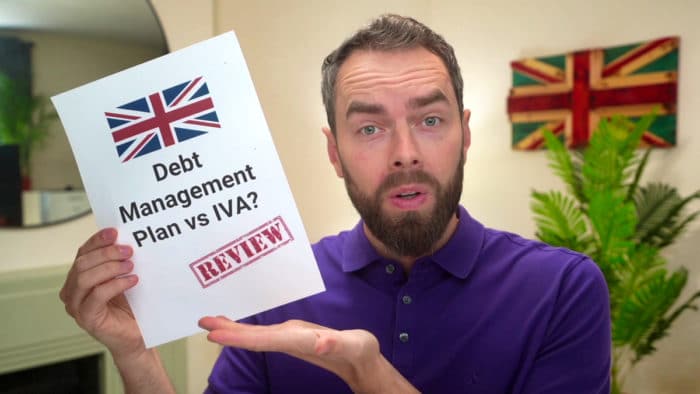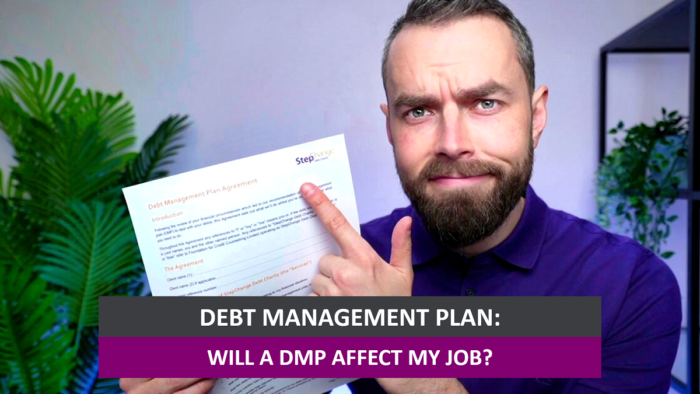What if Creditors Refuse DMP? Debt Management Plan Guide
For free & impartial money advice you can visit MoneyHelper. We work with The Debt Advice Service who provide information about your options. This isn’t a full fact-find, some debt solutions may not be suitable in all circumstances, ongoing fees might apply & your credit rating may be affected.

For free & impartial money advice you can visit MoneyHelper. We work with The Debt Advice Service who provide information about your options. This isn’t a full fact-find, some debt solutions may not be suitable in all circumstances, ongoing fees might apply & your credit rating may be affected.
Are your creditors saying no to your Debt Management Plan (DMP)? Don’t worry. You are in the right place. Each month, over 170,000 people visit our website looking for guidance on debt matters.
In this article, we’ll answer the following questions:
- Why might creditors say no to my DMP?
- What can I do if this happens?
- Can I write off some debt?
- What if only one creditor says no, but the others say yes?
- What other options do I have to manage my debt?
Navigating financial difficulties can be challenging, and it’s common to feel unsure about seeking help. In fact, Citizens Advice revealed that 60% of adults facing financial difficulties hesitate to seek assistance.1
We know how hard this can be, but don’t worry. With our experience, we’ll help you figure out the best way to manage your debts.
Can a Debt Solution be Rejected?
Yes. Creditors can reject your DMP proposal as they are under no obligation to accept any debt solution that you propose.
In most cases, the only way through which creditors will accept your debt management plan is if they feel that it would be a better-suited way of recovering money from you.
Your creditors may accept your DMP if you are able to prove to them that you won’t be able to pay back your debt to them without it.
Of course, then, your creditors are going to prefer reduced payments in the form of a DMP rather than no payments at all.
Many creditors don’t want to go through the arduous process of pursuing legal action against you which is why they are willing to accept your DMP.
However, in cases where creditors feel that accepting a DMP will lead to them recovering a lot less money from you that could otherwise be secured without a DMP, then they won’t accept it.
Some creditors may tell you why they’ve rejected your DMP and some may even suggest changes to the terms of your DMP.
If you oblige to them, then they’d accept it.
That being said, it’s important to note that creditors are not obligated to do this and there may still be times where your DMP gets rejected without you being informed of any reason why.
Some creditors reject your debt management plan simply because of the fact that they don’t like that you’re accepting services from a DMP provider.
This is because if that debt management firm is a private one, then you’d be paying fees to them as well which would mean you have less money to pay towards your debts.
This is why when you sit down with your DMP provider, you need to draft a firm proposal that is both affordable to you as well as acceptable to your creditors.
The payment offer that you present to your creditors will have detailed information about your financial situation such as your monthly income, monthly essential expenditure, assets, and debts.
Keeping this information in mind, you will present your debt management plan to your creditors.
Some creditors may also freeze interest and charges to your debt payments so that you get some breathing room to get your finances in order. However, it’s important to keep in mind that this isn’t a guarantee and not all creditors do this.
Some may even add additional interest or simply refuse to freeze interest.
How a debt solution could help
Some debt solutions can:
- Stop nasty calls from creditors
- Freeze interest and charges
- Reduce your monthly payments
A few debt solutions can even result in writing off some of your debt.
Here’s an example:
Situation
| Monthly income | £2,504 |
| Monthly expenses | £2,345 |
| Total debt | £32,049 |
Monthly debt repayments
| Before | £587 |
| After | £158 |
£429 reduction in monthly payments
If you want to learn what debt solutions are available to you, click the button below to get started.
What Should I Do If It Happens?
If your creditors reject your DMP, then you’re going to have to start looking towards other option and debt solutions.
Your debt management company with which you were attempting to get a DMP set up may be able to give you debt advice about you should do moving forward.
It’s important to get debt advice from a professional at this stage, as which debt solution will work for you will depend on many different aspects pertaining to your financial circumstances.
You may find that a debt relief solution that could be great for you might not be as good for someone else.
Make sure that whatever agency you get advice from is authorised and regulated by the Financial Conduct Authority (FCA).
I highly advise that you seek advice from an independent charity such as National Debtline or Payplan.
While you are obtaining advice and trying to determine what to do next, remember that your creditor(s) can still pursue court action against you such as getting a County Court Judgment (CCJ) against you or attempting to make you bankrupt.
Thus, it’s important that you stay in contact with them and ensure them that you’re in the process of setting up a solution in order to pay them back so they don’t pursue legal action against you.
» TAKE ACTION NOW: Fill out the short debt form
It can be a good idea to keep making small token payments to your creditors in order to prove your willingness to pay back your debts to them.
A creditor cannot refuse a reduced payment from you.
Thus, by making such a payment, you may be able to buy some time until you obtain information about what you should be doing next.
DMP Comparison
Professional advice may suggest you pursue other debt solutions, such as an IVA, a DRO, or even bankruptcy.
To help you better understand the main differences between a DMP and other debt solutions, I’ve put together this table.
| DMP vs Alternative Solutions | How It Can Help Tackle Debt | Suitable For Individuals… |
|---|---|---|
| Debt Management Plan (DMP) | An informal agreement to pay back non-priority debts in a more manageable way, but does not write off any debt. | …seeking a flexible arrangement without legal proceedings. |
| Debt Relief Order (DRO) | A formal solution that freezes debts for a year, after which they may be written off. | …with a total debt under £20,000, low income, and minimal assets, who cannot afford to pay off their debts. |
| Individual Voluntary Arrangement (IVA) | A formal, legally binding agreement that typically lasts for 5 years and can write off a portion of your debt at the end. Credit rating will be negatively affected. Homeowners can keep their home. | …with a larger amount of debt who can commit to a fixed repayment plan and want to avoid bankruptcy. |
| Bankruptcy | A formal legal process that writes off most debts but has significant consequences, including potentially losing your home and negatively impacting your credit rating and job prospects. | … with significant debts that cannot realistically pay them off. More severe option with substantial consequences. |
| Consolidation Loan | A consolidation loan involves taking out new credit to pay off existing debts. It can simplify payments and potentially reduce interest rates. But, you could also end up paying more interest overall. | .. with multiple debts looking to consolidate into a single payment, usually with a good credit score to obtain favourable terms. |
| Payment Holiday | Payment holidays offer short-term relief by pausing or reducing payments. Payment holidays don’t reduce the total debt amount and are usually for a short duration. | ..with short-term financial difficulties needing temporary relief from debt payments. |
| Equity Release | Equity release involves homeowners releasing equity from their property. It provides a lump sum or additional income by using the home’s value but reduces the property’s equity. | …with debts and want to unlock the value in their home to pay them off, reducing their property’s equity. (Ideally for older homeowners, usually 55+) |
| Informal Negotiation | Informal negotiation is not legally binding and involves negotiating with creditors for better terms. | …with debts and wish to negotiate terms independently and prefer to have a flexible, non-binding arrangement with creditors. |
Thousands have already tackled their debt
Every day our partners, The Debt Advice Service, help people find out whether they can lower their repayments and finally tackle or write off some of their debt.

Natasha
I’d recommend this firm to anyone struggling with debt – my mind has been put to rest, all is getting sorted.
Reviews shown are for The Debt Advice Service.
What if One Refuses but the Rest Accepts?
If a single creditor rejects your payment offer, then you should ask them why it isn’t acceptable to them.
You can try to negotiate the terms of the payment offer and see what’s acceptable to them.
Your creditor may be able to suggest changes to your payment offer which could make it acceptable to them and as a result, you may be able to change their minds.
However, keep in mind that they are not under any obligation to negotiate with you or inform you why your payment offer isn’t acceptable to them.
If this happens, then you may have to deal with that creditor separately.



